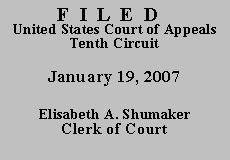

| ANTONIO FONSECA-ORTEGA,
v. SAM CLINE, Warden, Ellsworth Correctional Facility; ATTORNEY GENERAL OF KANSAS, Respondents - Appellees. |
|
Background
After the van he was driving struck a moving train, killing one of the passengers in the van, a Kansas jury convicted Mr. Fonseca-Ortega of involuntary manslaughter, aggravated battery, reckless driving, and transportation of an open container of alcohol. On appeal in state court, he claimed: 1) the reckless driving conviction was multiplicatus of his conviction for involuntary manslaughter based upon the commission of a DUI; 2) the reckless driving conviction was multiplicatus of his conviction for aggravated battery; 3) the trial court erred when it failed to instruct the jury on the lesser included offense of driving under the influence; 4) the prosecutor committed misconduct during closing arguments by improperly narrowing what the state had to prove and by engaging in improper burden shifting; and 5) the evidence was insufficient to support his convictions for involuntary manslaughter, aggravated battery, and reckless driving. The Kansas Court of Appeals reversed the conviction for reckless driving as multiplicatus but affirmed the remaining convictions and sentences. Mr. Fonseca-Ortega then filed a habeas petition with the United States District Court for the District of Kansas, raising improper jury instruction, prosecutorial misconduct based on statements made during closing arguments, and insufficiency of the evidence.
In a detailed Memorandum and Order, the district court denied Mr. Fonseca-Ortega's petition on all three grounds. First, the district court found that it could not review the jury instruction issue because "[t]he Supreme Court has never recognized a federal constitutional right to a lesser included offense instruction in non-capital cases." Fonseca-Ortega v. Cline, No. 05-3246, slip op. at 4 (D. Kan. May 10, 2006) (quoting Dockins v. Hines, 374 F.3d 935, 938 (10th Cir. 2004) (internal quotation marks omitted)). Citing this Circuit's "automatic non-reviewability" rule for claims based on a state court's failure to give such an instruction in non-capital cases, see Dockins, 374 F.3d at 938, the district court declined to review whether the trial court improperly excluded a jury instruction on the lesser included offense of driving under the influence rather than merely instructing them on involuntary manslaughter.
Second, the court found that no prosecutorial misconduct occurred during the closing statements. To warrant habeas relief, prosecutorial misconduct must have "so infected the trial with unfairness as to make the resulting conviction a denial of due process." Fonseca-Ortega, No. 05-3246, slip op. at 5 (quoting Darden v. Wainwright, 477 U.S. 168, 181 (1986)) (internal quotation marks omitted). The court found that since the prosecutor's comments were proper, they did not create any due process concerns. Although the prosecutor emphasized the importance of proving that Mr. Fonseca-Ortega was driving the car, he did not state that it was the only element the state had to prove. Further, the court found that the comments the prosecutor made regarding the weakness of the evidence presented by Mr. Fonseca-Ortega were reasonable.
Third, the court found that the record included sufficient evidence to support the conviction. In order to prevail on a sufficiency of the evidence claim, the court required Mr. Fonseca-Ortega to show that no "rational trier of fact could have found proof of guilt beyond a reasonable doubt." Id. at 7 (quoting Jackson v. Virginia, 443 U.S. 307, 319 (1979) (internal quotation marks omitted)). Because the record indicated facts that could lead a rational juror to conclude that Mr. Fonseca-Ortega was the driver of the vehicle, was reckless, and was under the influence of alcohol, the district court found that the evidence presented at trial was sufficient to support his convictions. Mr. Fonseca-Ortega seeks to appeal the district court's denial of his habeas petition on these same three grounds.(1) Discussion
A prisoner may appeal the denial of a motion for relief under 28 U.S.C. § 2254 only if the district court or this Court first issues a COA. 28 U.S.C. § 2253(c)(1)(A). A COA will issue "only if the applicant has made a substantial showing of the denial of a constitutional right." 28 U.S.C. § 2253(c)(2). In order to make such a showing, a petitioner must demonstrate that "reasonable jurists could debate whether . . . the petition should have been resolved in a different manner or that the issues presented were adequate to deserve encouragement to proceed further." Slack v. McDaniel, 529 U.S. 473, 484 (2000) (internal quotation marks omitted).
We have reviewed closely the district court opinion and find its reasoning sound and its conclusions correct. Mr. Fonseca-Ortega's submission to this Court contains no persuasive argument that the petition should have been resolved in a different manner, nor does he show that the issues raised were adequate to deserve encouragement to proceed further. We do not believe that reasonable jurists would find the district court's determinations debatable or wrong.
Conclusion
Accordingly, we DENY Mr. Fonseca-Ortega's request for a COA and DISMISS this appeal. Entered for the Court,
Michael W. McConnell
Circuit Judge
*.This order is not binding precedent except under the doctrines of law of the case, res judicata and collateral estoppel.
1.Mr. Fonseca-Ortega also claims that his involuntary manslaughter conviction and reckless driving conviction were multiplicatus. Since the Kansas Court of Appeals already vacated his conviction for reckless driving, this claim is moot.